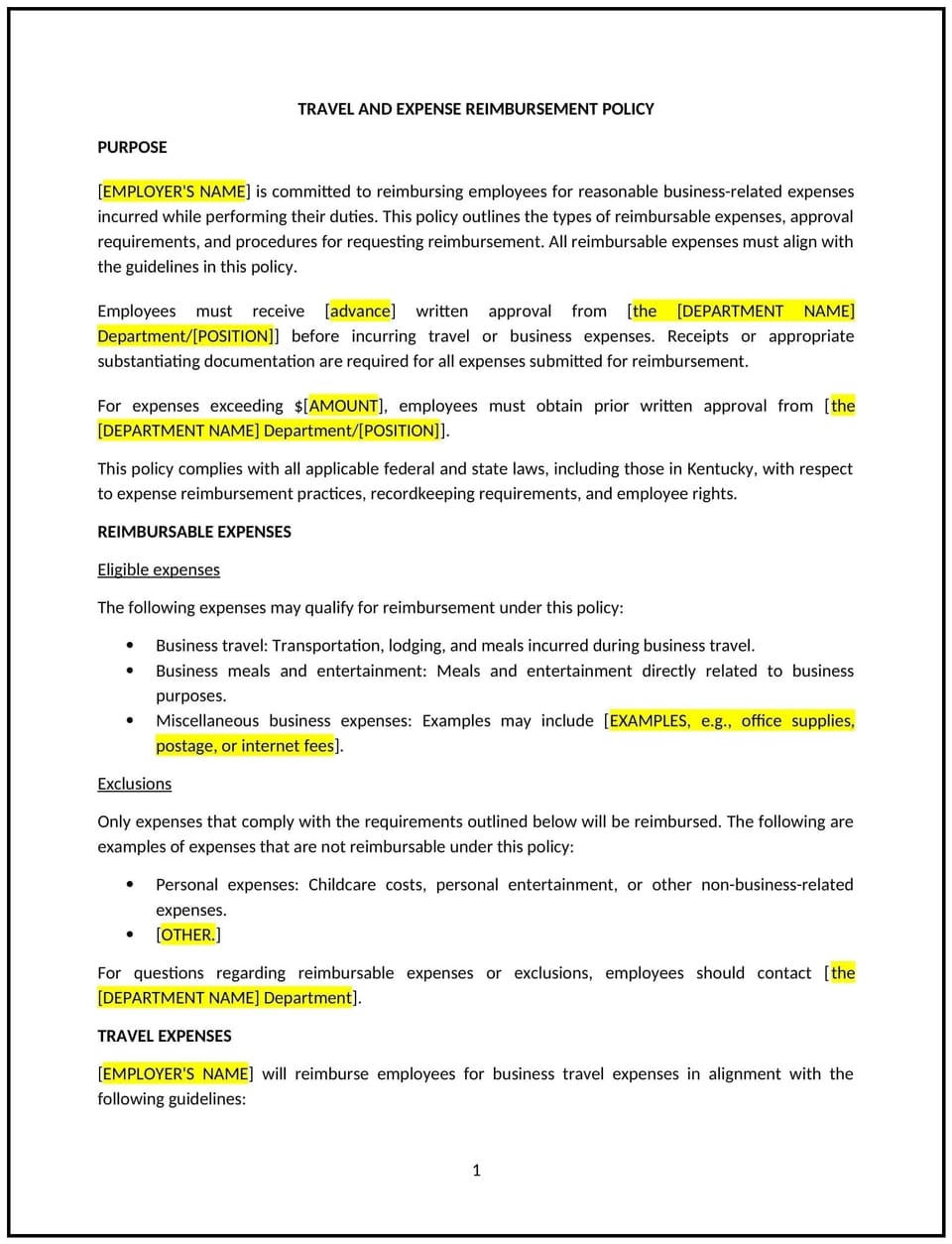Travel and expense reimbursement policy (Kentucky): Free template

Travel and expense reimbursement policy (Kentucky)
A travel and expense reimbursement policy provides Kentucky businesses with guidelines for reimbursing employees for business-related travel and associated expenses. This policy ensures consistency, fairness, and accountability while supporting employees’ needs during work-related trips.
By adopting this policy, businesses can streamline reimbursement processes, reduce financial disputes, and maintain cost control.
How to use this travel and expense reimbursement policy (Kentucky)
- Define covered expenses: Specify the types of expenses eligible for reimbursement, such as transportation, lodging, meals, and other business-related costs.
- Set spending limits: Establish clear limits or per diem rates for categories like meals, accommodations, and mileage to ensure consistency.
- Outline approval processes: Provide instructions for obtaining pre-approval for travel or significant expenses, such as airfare or conference fees.
- Require documentation: Specify that employees must submit receipts or other proof of purchase to support reimbursement claims.
- Include submission timelines: Clarify the deadlines for submitting expense reports, typically within a set period after the trip or expense occurs.
- Detail reimbursement methods: Explain how reimbursements will be processed, such as through payroll or direct deposit.
- Address non-reimbursable expenses: List items not covered under the policy, such as personal purchases or expenses exceeding limits without prior approval.
Benefits of using this travel and expense reimbursement policy (Kentucky)
This policy provides several key benefits for Kentucky businesses:
- Promotes fairness: Ensures all employees are reimbursed consistently for legitimate business expenses.
- Enhances cost control: Sets clear spending limits and guidelines to manage travel and expense budgets effectively.
- Reduces disputes: Establishes a transparent process for approvals and reimbursements, minimizing misunderstandings.
- Improves compliance: Aligns expense management with Kentucky regulations and best practices.
- Supports employee satisfaction: Provides clarity and efficiency in handling reimbursement claims, fostering trust.
Tips for using this travel and expense reimbursement policy (Kentucky)
- Communicate the policy: Share the policy with employees during onboarding and ensure it’s easily accessible for reference.
- Train employees and managers: Provide guidance on how to submit expense reports, obtain approvals, and avoid non-reimbursable expenses.
- Use expense management tools: Consider implementing digital tools to simplify tracking, reporting, and approving expenses.
- Audit regularly: Periodically review expense reports to ensure compliance with the policy and identify trends or issues.
- Update as needed: Revise the policy to reflect changes in Kentucky laws, travel costs, or business practices.
Q: What expenses are eligible for reimbursement under this policy?
A: Eligible expenses may include transportation, lodging, meals, parking, and other business-related costs, as outlined in the policy.
Q: Are there spending limits for reimbursable expenses?
A: Yes, spending limits or per diem rates are set for categories like meals, accommodations, and mileage to ensure consistency and cost control.
Q: How should employees request pre-approval for travel?
A: Employees should submit travel plans, including estimated expenses, to their manager or HR for approval before incurring costs.
Q: What documentation is required for reimbursement?
A: Employees must provide receipts or other proof of purchase to support their reimbursement claims, as specified in the policy.
Q: How long do employees have to submit expense reports?
A: Expense reports should typically be submitted within a defined period, such as 30 days after the trip or expense occurs.
Q: How are reimbursements processed?
A: Reimbursements are processed through payroll or direct deposit once the expense report and supporting documentation are approved.
Q: What expenses are not reimbursable?
A: Non-reimbursable expenses may include personal purchases, costs exceeding limits without prior approval, and items not related to business activities.
Q: How often should this policy be reviewed?
A: The policy should be reviewed periodically to ensure it reflects current Kentucky laws, business needs, and travel cost trends.
This article contains general legal information and does not contain legal advice. Cobrief is not a law firm or a substitute for an attorney or law firm. The law is complex and changes often. For legal advice, please ask a lawyer.


